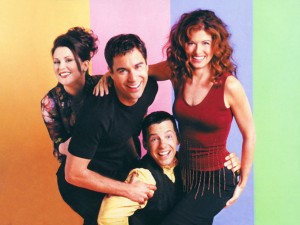No More Nice Guy Gay Character on TV ‘Where is Will and Grace?’
Threats to gay men’s self-esteem come in many guises, from Grindr chats that end abruptly after sending a shirtless pic, to the 16% of Britons who think gay sex should be made illegal (thanks guys), to the five remaining countries that believe we should be put to death. Until now, I hadn’t factored in that we may all be silently agonising over whether or not we compare favourably to Will Truman from TV relic Will & Grace – but according to new research, that is precisely what has been knocking our confidence.
Psychologists from Anglia Ruskin University in Cambridge have found that the positive portrayal of gay men on TV “can be damaging”. Apparently, gay men may have been left depressed by movies and TV shows that promote an assumption that we all must be well-dressed, emotionally available and whip-smart. The project leader, Dr Daragh McDermott, argues: “On the face of it, stereotypes associated with gay men, such as being fashionable or witty, appear positive. However, by their very nature, these stereotypes pigeonhole what it means to be gay and lead to unrealistic expectations of how gay men are expected to behave. Gay men who don’t fit the common stereotype are often marginalised for not living up to these expectations, which can have an impact on their mental health.”
If gay men are being portrayed with unrealistic positivity – which I don’t believe – perhaps that would go some way to counteract the negative stereotypes that have existed in film and TV for years. A study published in 2014 by the US gay rights campaigning organisation Glaad found that the majority of LGBT characters featured in major studio releases are still offensive or defamatory portrayals (funny that, from an industry that bankrolled Lesbian Vampire Killers).
The Jungle Book’s villain, Shere Khan, talks (with ‘gay’ voice) to the snake, Kaa.
Facebook Twitter Pinterest
The Jungle Book’s villain, Shere Khan, talks (with ‘gay’ voice) to the snake, Kaa. Photograph: Snap/Rex/Shutterstock
In his recent documentary, Do I Sound Gay?, film-maker David Thorpe explored how Disney villains, from Captain Hook to Shere Khan, often have stereotypically “gay” voices, meaning that generations of kids have been raised to associate being gay with being evil, if kind of fabulous.
Setting aside purely negative portrayals, the results of this latest study lead me to question whether the researchers can possibly have been watching the same programmes as I have – programmes where modern gay characters are often just as complex, damaged and infuriating as their straight counterparts. Apparently not. In fact, judging from the examples cited in the findings, their televisions have been operating on a time delay of 10-20 years. Alongside Will & Grace, they refer to characters from Sex and the City and My Best Friend’s Wedding. This last one was released in 1997, which, as a pop-cultural benchmark, was the same year the Spice Girls’ debut album was nominated for the Mercury prize.
While I agree that these examples promote an unhelpful stereotype of gay men as funny, sexless sidekicks, I’m unconvinced that these are qualities most gay men aspire to (most gay men I meet just want to be Russell Tovey, but that’s another story). If these shows have had a negative impact, it’s not because they have left swaths of gay men tremoring with insecurity that they’ll never measure up to Stanford Blatch.
Yes, series such as Will & Grace and Sex and the City reinforce a two-dimensional notion of what it is to be gay – basically, you’re kinda into Liza Minnelli – but things have moved on significantly since then. Take Looking, the HBO show about a group of gay friends living in San Francisco. Among their number are Eddie, a HIV-positive outreach worker for LGBT youth, and Dom, a struggling waiter in an open relationship with an older man. All in all, a slightly more complex take on modern gay life than Jack McFarland and his Cher doll.
Fox’s hip-hop melodrama Empire has been roundly celebrated for confronting the musical genre’s history of homophobia head-on. Jussie Smollett stars as Jamal, the black sheep middle child of a record executive, who is pushed out because of his sexuality. Jarring flashbacks to his abusive childhood sit alongside more – dare I say it? amusing – flashes of pernicious prejudice, such as his formidable mother Cookie’s insistence on referring to his boyfriend as “Dora”. Despite this, it’s clear that she loves him, which feels like a rounded take on a knotty subject.
On British screens, Russell T Davies’s Cucumber was similarly nuanced, exploring the life of a middle-aged gay man in all its messy, complicated glory. The protagonist, Henry, was a grumpy, selfish narcissist, entirely disillusioned with his own life. Most of the characters were gay, but were they in any way cute or aspirational? God, no. Or, at least, not from where I was sitting.
Although the new study relies on dated characterisations, the researchers and I can agree on the need for more multifaceted gay characters – not least to quiet the vocal minority. Perhaps as more gay characters reach our screens, both aspirational and abominable, less will hinge on the few that we do see. Because no TV show can be all things to all gay people – and shouldn’t be expected to try.


Comments